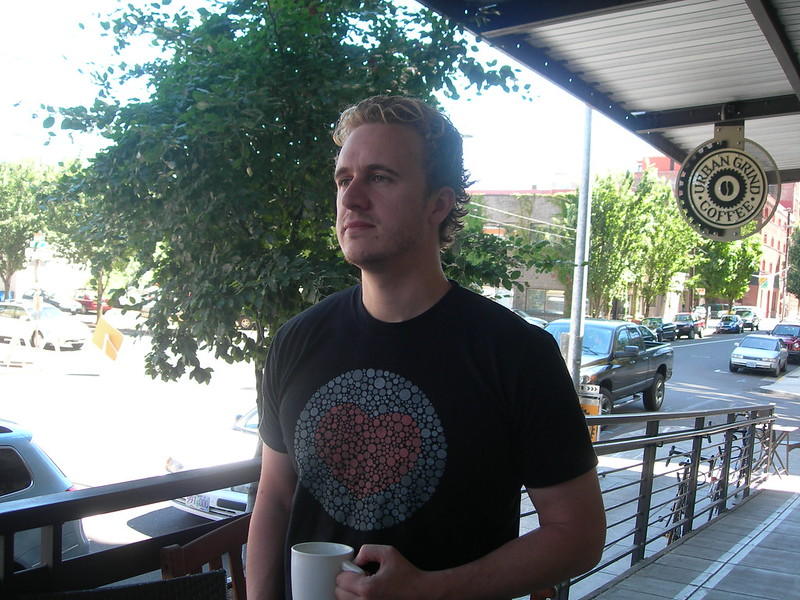Darius Monsef IV added the IV to his name because in his opinion, there have been three great Darius’s who have walked the world before him, and he wanted to be the fourth. The interview took place outside of Urban Ground Coffee in Portland, Oregon, next to a semi busy street with occasional foot traffic.

Interview: How To Start an Online Community
My mom’s from Portland. So I’ve kinda been back and forth to Portland a lot. I just moved. I left Hawaii to go to college in Boston. I didn’t like what I was doing. I left to work for an internet company here in Portland. Then moved to Tucson. I lived in L.A., then Florida. It’s just kinda…I’ve been pursuing my passion trying to find the right place for me. It feels like Portland, right now.
So what are you trying to pursue?
I guess its being creative and what feels right to me. I’ve done so many different things along the way. Like Tucson, that chapter in my life, I didn’t really like what I was doing in real estate. It just didn’t feel right to me. I worked at it for a year, I got to the point where I was just about to start making good money…it just didn’t feel right. That wasn’t where my heart was. I hated…I don’t mind working long hours. I just hated the work I was doing.
Now what I’m doing is mostly the creative web work. I’m running COLOURlovers, which is a creative color design resource. I don’t mind doing long hours for that.
I also do nonprofit work. I co-founded a disaster relief nonprofit called Hands On Disaster Response.
It was in the frustration of figuring out what I wanted to be doing that I went to Thailand for disaster relief. I had been doing freelance design work for awhile. Freelance can be rough. It’s great when you make good money. You may have a really big month and then you could have three months of nothing. Unless you budget well, which I don’t always do. It really hurts for those low months. I got tired of that infrequency. Then the tsunami hit Thailand and I just felt like I had to get away. Just unplug and go somewhere different and do something I’ve never done.
None of the volunteer agencies would take me because I was unskilled. So I just figured I would go to South Thailand and figure it out on my own. So I left figuring I’d be there for two months and stayed for four and a half. That’s where I co-founded that nonprofit and brought it back to the states and did Hurricane Katrina for Biloxi, Mississippi. In the Philippines our organization has been to Indonesia.
So you just bought a one way ticket?
I bought an open-ended ticket. I knew I had enough money for two months. I figured I’d volunteer for a month and then just travel for a month. But really, I got into what we were doing and I just volunteered for two months and wrote home to friends and family and said, ‘I’m broke, but this is really important to me and I want to continue doing this.’ I was lucky enough to have friends and family who pitched in and gave me enough money to survive. It ruined my credit. It’s not a good idea to not work for a year. But I stuck through Thailand for five months and Mississippi for five months as well. Basically, I worked eleven months out of two years in disaster zones.
How have those experiences affected what you’re doing now?
I just have an appreciation for doing what I want to do. The lessons I learned over there is that…and we take it for granted, is that life is absolutely fragile. I could just be walking across the street and get hit by a car. Especially in Thailand. Hundreds of thousands of people who at 10:40 a.m. were waking up for a leisurely breakfast and then just got wiped out. They didn’t have a chance to do what they’ve always wanted to do. It’s really a lesson of doing what you want to do because you’re not guaranteed the chance tomorrow. Why suffer through a job you hate? Why live for Friday, Saturday, and Sunday only? Why don’t you find a job you love doing and live it everyday?
Now, today, well, you founded COLOURlovers. Which to me, looking at the site, and I’m sure you get this often, what the hell is this?
We get an even mix of it. It’s something we haven’t worked on very well- explaining what the site is to people. Some people immediately get it. They love it. They spend all day on it. Some people look at it and don’t get it yet.
What it’s growing into is a colour resource. What we’re trying to build is color trending and forecasting. Based on what we decide is the ‘world,’ we think this color is going to be popular next year. Instead of some people in a room somewhere saying that this color is going to be popular two years from now. That to me doesn’t make a lot of sense.
What we’re doing is bringing a community together, sharing design inspiration and setting our own trends.
This is your career?
Yeah, it’s what I do every day.
You mentioned that you do consulting and everything, I’m wondering how this pays the rent.
The COLOURlovers site itself is growing rapidly. It’s exciting to do. Basically, if you strip away the color part, which confuses a lot of people, I run a internet start-up. So I have a site that’s about to break 20,000 members and our traffic is in the half million visitors a month. So it’s really starting to ramp up.
The site itself makes money with advertising income and sponsorships. That’s not there yet. It’s not enough to survive on. But it’s a long term goal. It’s pushing through and making it so that hopefully this company survives and makes me enough to live on.
So how do you create a community like that? With 18,000 people and half a million hits a month, how do you do that?
It’s been a learning experience. Luckily it seems to be a good idea. So I think you have a benefit that if it’s a good idea, it’s naturally going to grow on its own. But, I’ve spent a lot of time and a lot of hours marketing it, trying to get it to the right people. Getting it to people that will understand it. I think part of the reason of why it has grown, without us even explaining it to people, is that it got to the right people.
It is to the independent designers and contractors who really do need color inspiration on a daily basis. Now that we have that really small niche of people, we’re now trying to grow it so that everyone can have some inspiration from it.
So you basically went out and sought the people this idea would hit home with and went from there. And it spread like wildfire?
Slowly. I started Colourlovers right before I left to go to Thailand. It was this funny idea. I was in art school. I thought, instead of people rating whether it was ‘hot’ or ‘not,’ or rating people’s photos, they rated colors. It was a half joke. I thought it was a funny idea.
I started it and then went to Thailand. For eleven months the site grew naturally on its own. People found it and found a use for it. When I got back I was like wow. People are using this site and I think it has somewhere to go. Then I invested time. I took in a small angel loan for an investor to completely overhaul the site last November. That’s when it really started to go.
How was it before that?
Last November, it was like 4,000 members. In seven or eight months, maybe a year, almost, we doubled traffic twice. I can show you the graph. It’s nice to see that. It’s exciting. The hard part is that we’re not making a lot of money yet. So server costs grow every month. Growing staff. The money isn’t there yet, so it’s a little bit of a gamble to hope things turn out the way you want them to.
What makes you put in these long hours?
I realized that one thing I love doing is creative problem solving. It’s really the same for me doing the non profit work or doing the web work. For the web, everything changes every day in a start up. So I have ten things I write the night before that I have do tomorrow, and I get eleven new things without getting to the ten things that I needed to do. But it’s a fun challenge because you have this puzzle of trying to get everything done in a day. And, everything changes every day.
With our non profit, we managed the volunteers. In Mississippi, we had 180 unskilled volunteers who showed up to work and a list of problems that needed to get solved. So how do you find team leaders out of that group that can then take other people. It’s really just this big strategy. How do you find the solution to a problem? That’s really what I enjoy.
Do you see the growth of ColourLovers carry over to the non profit in attracting people and building a community?
I haven’t looked at it like that, and I haven’t marketed my non profit to my community much. Throughout running it, I have to leave for three weeks to four months at times on deployments. I have to make sure to let all my members know. I was just in Greensburg, Kansas for a week to check things out after the tornado. I let all my members know.
I haven’t really tied the two communities yet. It is tied in that the proceeds ColourLovers makes goes to the non profit. They are nice to be able to step away from the non profit and work on my business, but still feel good about it because in the long run, it will benefit the non profit.
How has the online thing changed your life with 18,000 people coming to your site and seeing that you created this thing? Do they reach out to you for consulting, advice, anything like that?
I haven’t marketed myself much for the consulting, so I’m not necessarily trying to get business from it. I think the thing that has changed the most is the amount of negative attention you can get, and how quickly that can turn on. I think a lot of people will say that any press is good press, but I don’t know.
We just recently had this big flare up of this negative attention. People can get really nasty on the internet when they’re not sitting across the table. When they’re sitting behind a keyboard, they can say some things that are pretty mean. It’s learning to take that in stride.
Nice things are great. You can get ten positive things of feedback in a day, and it’s the one person who is really negative that can bum you out and take away the other ten. It’s just trying to push through that and hear mostly the positive. And be willing to listen to the negative and see if you can learn from it. And at the same time, recognize that they don’t know who you are.
So how old are you now?
I’m 25.
If you could go back three years ago and tell yourself one piece of advice to prepare you for what you were going to embark on in finding your passion in a career, what would you say?
The interesting thing is that I regret nothing. I’ve had some rough times and made some bad mistakes and done some dumb stuff, but if I hadn’t have done any of that, I wouldn’t be where I am today. Not necessarily on the success level, but just doing what I love to do. And you really have to go through the lows. You have to learn everything you don’t want to do sometimes to find exactly what it is you want to do. So if I would tell myself anything, it be that everything happens for a reason.
Typically they say I’m going to go from A to B. I’m a kid, I want to be a doctor. That’s a long term goal with a destination. My path has never felt like that. Instead of a long path, I get all these different puzzle pieces along the way. I got something from Tucson. I got something from Florida. Alone, they don’t make any sense. But when I start to step back, I can recognize that actually, they’re all related in some way. It’s these puzzle pieces that make no sense on their own, but it paints the picture of what I really want to do when you put them all together. So it’s a lot of random stuff, but it all fits together.
Is this something you see yourself doing for awhile here?
I want to continue to do the internet start up stuff. I have an overactive creative gland. I love thinking up stuff. I keep a journal of all the different ideas I have. Ten percent of my day is focused on not starting anything else. Because I feel like I have to push COLOURlovers. I got to take it to a place where it runs on its own. Just write out the idea fully, and then it away in a book. I can’t focus on it. But I definitely want to stay in the creative internet world. And just keep doing that for a long time.
How do you weed out the good ideas from the bad ones?
Some people are worried about getting a non disclosure before revealing an idea. They’re worried about their ideas. I really feel like I have a lot of them, so I’m not worried to talk about it. So I just talk to close friends and family, and people I know in the industry.
I like to bounce ideas off of people. You get a pretty immediate sense of whether it was a horrible idea, or if it’s a good one. We have a couple good ones that are up next after COLOURlovers. Things keep changing.
So this one right here, do people tell you that you’re crazy for trying to start this thing?
I still get that. People think about color and they think about all these negative connotations. It’s color. It’s only for women. It’s going to be for a small niche of people. But really, it’s in every different aspect of life. Even a landscaper who does manual labor for a living, they work on people’s lawns. So what’s the ideal for a region of the United States for lawn color? Obviously certain people in Portland, Oregon can be a lusher green. So they need more water.
There’s all kinds of different variables that play into a lot of different occupations that have to do with color. That’s the big goal for us. How do we make it not such as weak thing, color. How does it reach everybody?
Is this something that you were interested in at an early age?
With color?
Yeah. I think that your background mentioned that you were in a fashion?
Yep.
Does that interest trace back to anything?
I think how I got into fashion was that basic level of loving creativity and any different medium. I like art. I’m not a very good artist hand wise. But the art school I was at was fashion school. When I took a color theory class is when I started COLOURlovers. From the class, I thought color was really interesting. All the associations people make with different colors. Why is red and yellow used in fast food restaurants? I still don’t know that, but I’d like to figure it out.
The color theory class just didn’t talk about any of that. So I was like, ‘Well. I’ll go figure it out on my own.’ That’s every day with the COLOURlovers blog. We try and take a little bit of that. Why are colors used? Someone just did a post about all the top 25 highest grossing movie posters and the colors that they used. It’s interesting to look at that when you can break it down.
No one else is doing anything like this.
You have classical institutions around color that are fifty year old companies doing specific things with color. They’re not yet embracing the creative community social networking and Web 2.0 offers. That’s the space we’re in. We’re going to make it a household name with color.
That’s cool. Is there anything else you’d like to add about your journey, COLOURlovers, a shot out to the world?
I guess my only shot out would be to enjoy the journey. That’s what it’s all about.
Didn’t one of your non profit volunteers get recognized by the First Lady?
Actually, George Bush came out and talked to about 45 of our volunteers. One of the volunteers was chosen to be recognized with the Presidential Leadership Award by the First Lady. That volunteer actually just joined on as an Operations Director.
From each project we take on the people that we can recognize that’s what they want to do for a period of their life.
That’s pretty sweet. Did you get to meet him?
No I didn’t. That was one of those, as a manager of the volunteers, you kind of just let them enjoy the experience and step back.
It’s funny. You guys do unskilled volunteers. Volunteers that the Red Cross wouldn’t take because they don’t have disaster management. It’s funny that George Bush would choose to reward the ‘most incompetent’ volunteers.
I’m not really going to get into the political affiliations, but what I think is important, or what I respect and what we tried to get the volunteers to respect, because a lot of the volunteers that showed up wouldn’t be people that necessarily would appreciate meeting our current president. But what you pass on to them is that you’re being recognized by the Office of the President of the United States. That in itself, should be respected. Whether or not you respect the person who is in that office, that’s a pretty cool honor to be recognized by that office. That was the good in that experience.
Well, I was just kidding.
It’s come up a lot.
I think it’s great to have normal people doing things. After 9-11, when everyone wanted to give blood, they just stopped taking blood from people. People who can manage those resources that are marginalized are people that are really doing something.
That’s part of the reason why we exist. There are very big organizations, Red Cross and Salvation Army, that get blasted for inefficiencies. But they’re massive organizations. I don’t know what it’s like to deliver 30,000 FEMA trailers. It’s got to be a pain in the ass. They didn’t do a great job with it, but at the same time, it’s still a big problem.
So what we try to do is recognize that big organizations do very specific things, and they’re not flexible. How can we fill in the gap and be flexible?
One example from Mississippi was that if you got approved for a FEMA trailer, FEMA would say that they’d bring you a FEMA trailer. You’re approved for it. But you had to have a thirty by thirty spot cleared on your yard. You need to have the sewer and water hook up cleared. But if you just had your house leveled on your property and you’re a sixty-five year old woman, it’s pretty hard to get your property cleared for that.
So we brought in unskilled volunteers from wherever in the country who wanted to show up. We put them to work and let them clear that property and then called FEMA saying they could deliver the trailer to the property.
It was like, you can sit around and raise flags and complain about things, or we can just get shit done and help people. That’s really what we try to do. Get in, figure out what we can do. It changes every project everywhere we go.
It’s important to me, sort of what you guys are doing, educated your peers and give them a resource. I want to reach out to other young entrepreneurs. I like going out there and giving them my insight so they don’t have to make the same mistakes I made.






